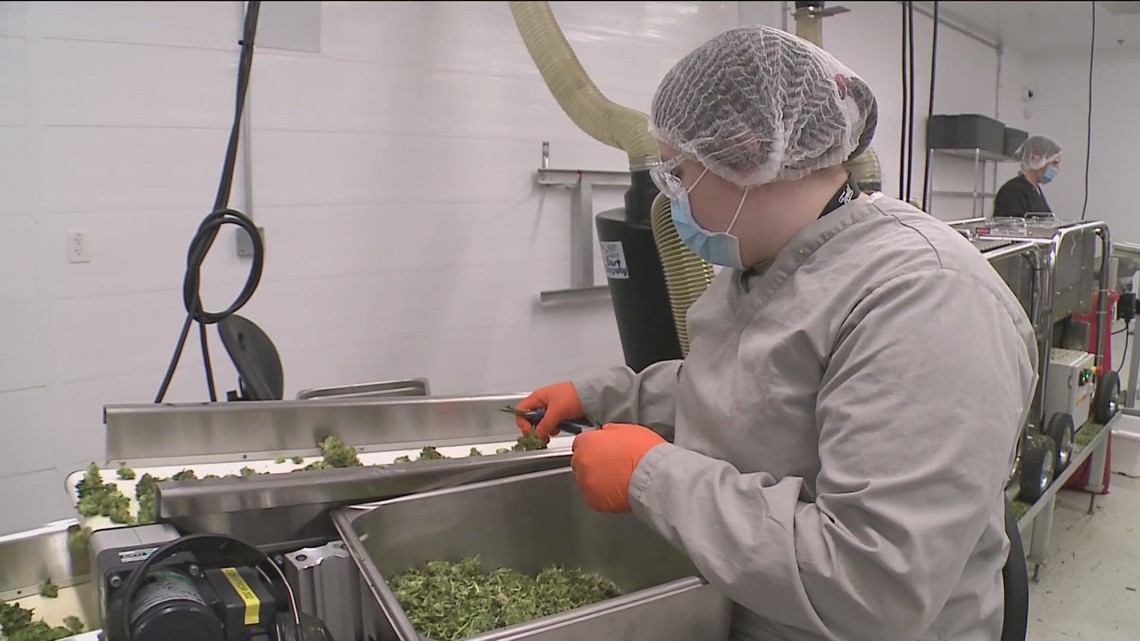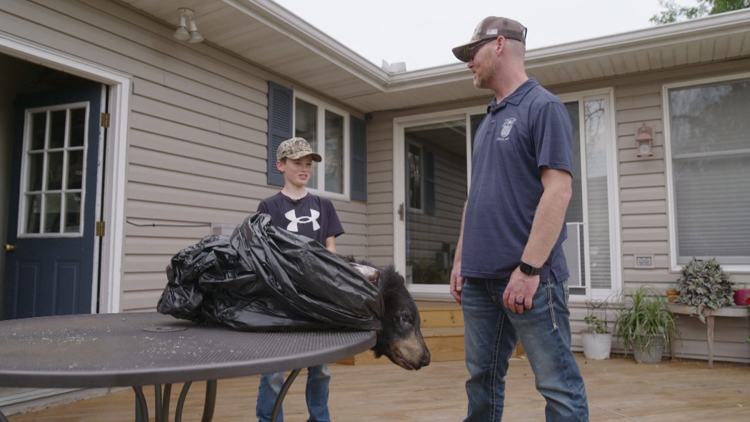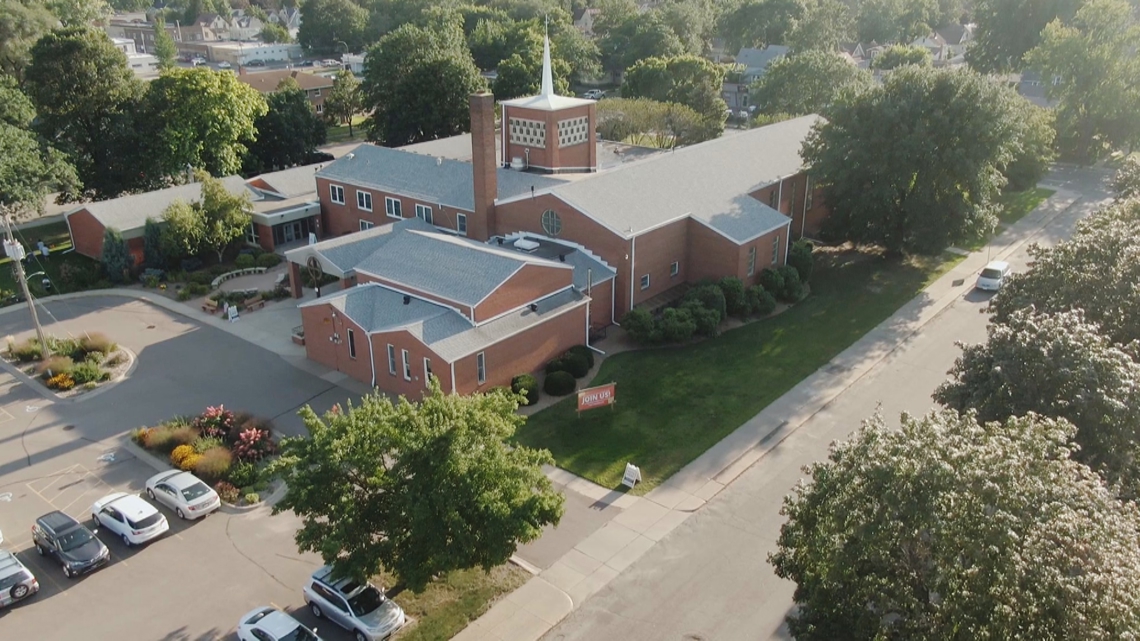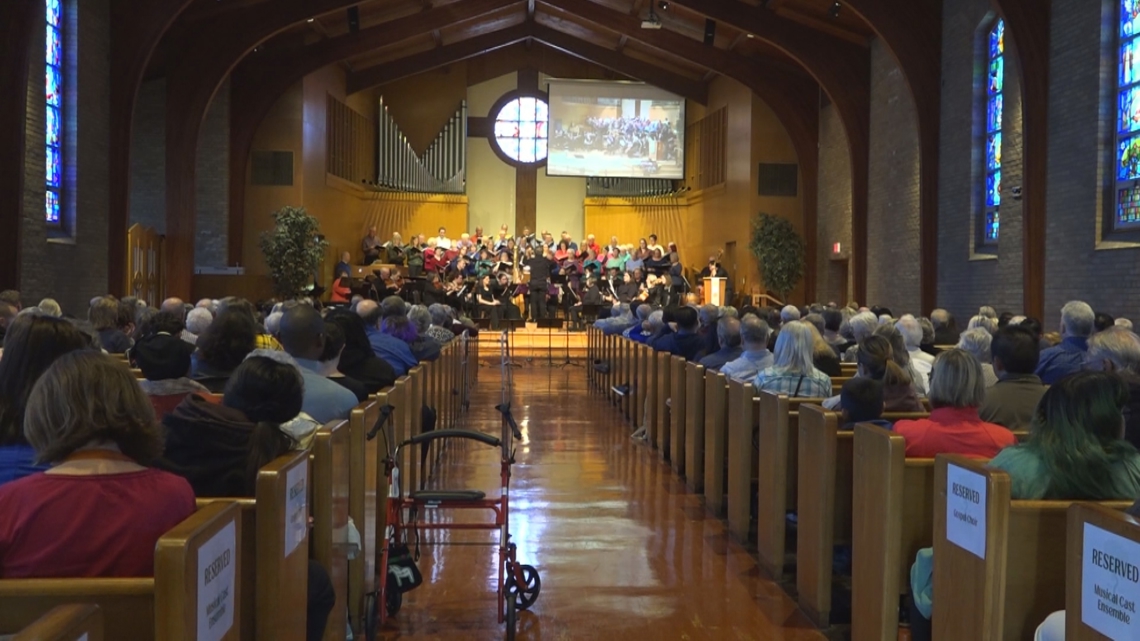Kare11
Ukraine’s ambassador to US visits Minnesota


Oksana Markova headlined the first stop in a tour designed to rally support for Ukraine’s battle with Russia.
MINNEAPOLIS — Ukraine’s ambassador to the U.S., Oksana Markarova, visited Minneapolis Thursday to launch a whistle-stop tour to rally support for her nation’s ongoing defense against Russia’s invasion.
She shared the stage at the Ukrainian American Center with Heather Conley of the German Marshall Fund of the United States and Howard Buffett, the Nebraska farmer and philanthropist who heads the Howard G. Buffett Foundation.
Ambassador Markarova said she deeply appreciated the support of Americans and the U.S. Government, and asserted it needs to continue.
“When we talk about values and principles on which our countries are built, if we are serious about them, then we have to defend them everywhere,” Markarova told the crowd from Minnesota’s Ukrainian community.
“If we allow Ukraine to fall, then how can we still go ahead and say these values are sacred to us?”
Organizers of the tour say it started here in Minnesota because of the state’s deep, historic ties to Ukraine. The ambassador said it’s not just a matter of money and supplies.
“The most important support is your voice, and the fact Americans who support us can say it out loud, say it by putting the flag outside of your home, by telling your neighbors why you support Ukraine,” Markarova told reporters after the event.
“Just continue supporting us because we can win. We can win this one.”
Buffett noted that the stakes are high for Americans in Ukraine, because Russian’s ambitions may extend into NATO nations that the U.S. has committed to defend in warfare.
“His intent is to destroy Ukraine, destroy the Ukrainian people and then move on,” Buffett remarked. “If Putin beats Ukraine and moves deeper into Europe, we will be sending our children to fight that war. That’s what’s at stake.”
Conley said her foundation is working towards restoring the war-torn nation, just as the U.S. and its allies rebuilt its former enemies after World War II with the original Marshall Plan.
“This entire whistle-stop tour is about making sure that communities in the United States understand fundamentally what’s so important about Ukraine, and that our communities are joining together,” Conley told reporters.
Some Congressional Republicans have wavered in their support of Ukraine and NATO. They’re willing to extend aid to Ukraine as part of a deal that also includes more money for security along the U.S.-Mexico border.
One goal of the tour is to draw empathy from American farmers to what Ukrainian farmers are going through. The farming region once known as Europe’s “breadbasket” has been hobbled by the invading Russians.
“You’re seeing combines that are blown up,” Buffett explained. “You’ve seen farmers that have died in their fields as a result of it. You’re seeing farmland with thousands of land mines that will need to be removed.”
Ambassador Markarova said the Russian blockade of Ukraine Black Sea ports has made exporting agricultural products much more difficult.
“By destroying the crops Russia specifically targets the grain storage, the sileages, the elevators.”
Among those on hand for Thursday’s event were severely injured Ukrainian Army soldiers being treated here through the Protez Foundation. The ambassador spoke to them in their native tongue.
Thursday’s press conference was held in the gymnasium of the Ukrainian American center. a space filled with medical supplies destined for those wounded on the battlefront or injured in Russian missile attacks.
Kare11
St. Paul City Council gives cannabis zoning the green light


Weed companies will be able to consider commercial real estate property as a possible site location
ST PAUL, Minn. — The St. Paul City Council passed an ordinance Wednesday for adult-use cannabis zoning within city limits.
“What we’ve done today is just set a zoning standard that says here is where you can consider and contemplate having those types of facilities,” said Council President Mitra Jalali.
These businesses can look at commercial real estate spaces within city limits.
“Other cities around the state frankly are rejecting the economic opportunity that’s possible saying ‘You can’t have these anywhere,’ they’re using really regressive zoning, and so I hope St. Paul can set another end of the spectrum and encourage other cities to follow suit,” Jalali said.
She said opening more of the city to cannabis operations could bring in more money.
“It’s really important to realize the economic opportunity it represents, right. We can generate and collect local sales tax. We can use that revenue to help the city in other ways,” Jalali said. “I think that we have regulatory structures in place to be able to support safety to make sure that everything is following state law. That is one of the cities rules.”
However, some people aren’t as excited. Zev Radziwall, executive director of St. Anthony Park Council, said his neighborhood is concerned cultivation facilities could impact public health.
“The biggest concern is air quality,” he said. “How do we mitigate that odor, so we don’t have the skunky smell permeating throughout neighborhoods and affecting residents.”
Jalali said there are regulations in place to control odor.
“The state law sets out a standard of how facilities have to regulate odors on and off the property line,” he said. “We took what state law said and we mirrored it into our local ordinance so the city can also be on the enforcement side of that and basically have an additional layer of regulatory support.”
Radziwall said he would have liked to see a more conservative distance including daycares. Currently, the ordinance mandates weed facilities to be at least 300 feet away from primary and secondary schools. The council talked about including daycares but decided to possibly bring up it for consideration at another time.
The ordinance would allow these businesses to cultivate and sell all under one roof. Radziwall said St. Anthony has a lot of warehouses where these businesses could potentially grow, which is why he would like to see tighter regulation.
“We hope that it’s the beginning of a conversation not the end,” he said.
Jalali said by allowing these businesses to open in more areas, it should help prevent over concentration in one area.
“Part of the logic actually in having the zoning being pretty permissive is that when you have less area that you can do these businesses in it does concentrate them, so I think what we need to do is look at the applications that come in, see if that’s shaping up in any type of way or pattern that’s cause for concern,” she said.
Kare11
Father credits son for saving his life during a bear attack


Ryan Beierman says his son, Owen, shot the 200-pound bear during a hunting trip near Siren, Wisconsin.
SIREN, Wis. — A 12-year-old boy saved his dad from a bear attack at their cabin north of River Falls in Siren, Wisconsin.
Owen Beierman says he shot the bear when it started mauling his dad, Ryan. The two had been hunting at the beginning of September when it happened.
Ryan says Owen first spotted the bear that day and shot at it but missed. The injured animal ran into the woods and the two waited before going after it. They performed grid searches, followed a blood trail and even used a neighbor’s dog to try and track it.
They didn’t have much luck, until the dog led them into an overgrown area several hours later and the 200-pound bear was about 10 feet from Ryan when it attacked.
“I had the pistol in my hand and I was hitting him in the head, trying to get him to let go,” said Ryan. “I looked down and all I saw was teeth and claws coming at my face and I remember hearing the first bite.”
He says a fight ensued and then he heard Owen take a shot. He felt the bear’s weight shift and he was able to shove it off of himself.
“I saw him (the bear) knock him to the ground and I just saw the black outline and shot over the dog’s back and hit the bear,” said Owen. “I just felt like, shoot the bear and save my dad; it’s all I really remember.”
Ryan has stitches to repair the deep wounds on his face and has bite marks all along one arm and a leg. He has other scratches along his face and head, too.
“He needed to go to the hospital when I saw his cheek hanging,” said Owen.
A neighbor helped the two get out of the woods and to the hospital. Ryan says the looks on the faces of the police officers who later helped them made him realize how badly he was injured.
“He was trying to live and I was trying to live at that point,” said Ryan about the bear.
The father and son eventually claimed the bear’s remains and are now debating how to mount the animal and where to put it. Ryan says he plans to bear hunt again in the future — despite the story he says his wife didn’t even believe when he first told her after it happened over the phone.
“I don’t care if they believe it or not, I got the scars to prove it,” said Ryan, laughing.
The Wisconsin Department of Natural Resources (DNR) says the attack on Ryan is the 14th in the state since 2013.
Kare11
First Covenant of St. Paul celebrates 150 years

While the church practices what it preaches – by opening its doors to other community-based organizations and partner churches – it also honors its own history.
ST PAUL, Minn. — Most faith communities identify one day of the week as “The Lord’s Day.”
But at First Covenant of St. Paul, every day offers a divine opportunity for outreach and mission.
“Literally every corner of our property inside our building, all of it is being used seven days a week and somehow making this community a better place,” said Pastor Anne Vining, First Covenant’s senior pastor.
And while the church practices what it preaches – by literally opening its doors to other community-based organizations and partner churches – it also honors its own history. And that approach has helped the church defy the trends troubling other faith communities.
According to Gallup: 20 years ago, 42 percent of U.S. adults attended religious services every, or nearly every, week. A decade ago, that figure fell to 38 percent. Today, the number is currently 30 percent.
But while First Covenant has seen some of its regular attendees move to less frequent or virtual options, they’ve largely maintained their congregation size for the last 20 years. A reflection, church leaders believe, of a church family committed to the right values.
“While churches are closing left and right, this church has a bright future,” Vining said, adding, “We seek to be a place that is following in the ways of Jesus and welcoming all people.”
A mission that began on April 21, 1874
Located on the corner of Hyacinth Avenue and Arcade Street – in the heart of St. Paul’s East Side – First Covenant has long been at the epicenter of one of the state’s most dynamic and vibrant communities.
“We started as a church of predominantly Swedish immigrants,” Vining recalled, noting that the thread of immigrants is woven throughout the church’s history.
“We were an immigrant community 150 years ago, and we still are today. It’s just different, different communities, different immigrants that are coming from around the world,” Vining shared.
In fact, from those initial days of a more “monocultural community” – both within and outside the church’s red brick walls – the church has changed along with the East Side community: From a concentration of Swedish and Italian families, to Vietnamese and Hmong newcomers, to the Karen community, to people from several countries in Central and South America.
But amid all that change, Vining said the church has remained constant in its focus: “I would say this has always been a church of mission.”
What that mission looks like in 2024
Which brings us back to that seven-days-a-week mission. First Covenant, largely under Vining’s leadership, has partnered with several community organizations and churches, including:
- Fruit of the Vine Food Shelf, run by La Iglesia, St. Paul;
- Family Values for Life, an organization offering support and programming for both children and families;
- Jonathan House, housing for asylum-seekers – located on church property – and in collaboration with the International Association for Refugees;
- St. Paul Public Schools, by providing support through musicals and other arts and faculty programming;
- Followers of Christ Hmong Baptist Church;
- Haitian Christian Fellowship;
- La Iglesia, St. Paul;
- Urban Roots, a community garden that “promotes entrepreneurship by teaching youth interns to manage gardens and crops” for later distribution, according to the church website.


“When it comes to investing in a community, it’s all about relationships,” Vining said when reflecting on these partnerships and others – including missions overseas.
Vining believes it’s also about the “mothership” relinquishing control and walking alongside its community and church partners.
“We’ve figured out how to go beyond just sharing space to actually being partners with a breadth of people who are doing incredible things for the kingdom of God,” Vining said.
Diversity even within the original church
No doubt, the community and church partners brighten the fabric of First Covenant. But the original church community also continues to poignantly grow and learn.
Among the church’s most beautiful perspectives, is:
Bob Ash, who’s attended the church for 60 years.
“When you come to a church like this, you realize that it’s been here a long time, and you’re standing on the shoulders of thousands of people,” Ash said, noting how he and his wife, Marilyn, could always relate to the original church members.
“Their lives were not that much different from ours. They wanted to live a life of faith and service… I don’t think we’ve lost our interest in leaving this earth in better shape than when we came,” Ash said.
Indeed, Bob and Marilyn watched their daughters grow up and marry within First Covenant of St. Paul. And this year, Bob also celebrated the life of Marilyn, his wife of 65 years, in the same brick building.
“Our pastors have a real commitment to serve the Lord and to serve our fellow humans right where we’re at,” shared Ash – who was also a former leader at White Bear Lake Area Schools.
Ash added: “We did not have to go to the mission field, the mission field has come to us.”
Isabel Patrick Pacheco has attended First Covenant for 13 years.


Patrick Pacheco first came to First Covenant as a participant in one of the church’s elaborate musicals – a product of the partnership with St. Paul Public Schools.
“I think that the community here is really what really kept me here,” said Patrick Pacheco.
Patrick Pacheco, who recently graduated from the University of Minnesota with a Bachelor’s in Aerospace Engineering, now works at one of First Covenant’s partner organizations: She’s the youth programs coordinator for Family Values for Life.
“Knowing that there is a desire to be that multicultural church is really hopeful and something that I really appreciate,” Patrick Pacheco said.
DeDray Mitchell has attended First Covenant for 11 of his 13 years.
And this great-grandson of former church leader, Roger Quant, says his loyalty is based both on legacy and kindness.
“Everybody here is just really kind and loving,” Mitchell eloquently shared.
This month, the very church built on welcoming others will soon welcome another era. On Sept. 29, the leader who helped forge so many strong church partnerships will herself answer a new calling.
“I just feel like it’s time for me to pass that baton on to that next generation,” Vining said about her imminent retirement from ministry.
But while Vining knows it will “be very hard” to pass that baton, she also knows her committed ministry team, as well as the entire congregation, will carry on the First Covenant mission that began 150 years ago.
“I feel like if you’re looking for a place that is authentically trying to live what they believe, that’s what we’re trying to do,” Vining shared, adding, “I think when you walk in the door, you feel this sense of God’s presence, that God’s love is here.”
To learn more about First Covenant of St. Paul, just click here.
Editor’s Note: First Covenant of St. Paul today includes a congregation of both new members and families now in their fifth generation. KARE 11’s Karla Hult is a member of one of those families. Hult’s Swedish great-grandparents on both the Hult and Olsen sides first started attending the church back in the 1800s; her grandparents, dad and his siblings, her sisters, cousins and herself and now, their children have all attended the church in St. Paul’s East Side. But Hult notes everyone connected to this unique community believes its greatest beauty is in how the church always welcomes its newest members.

